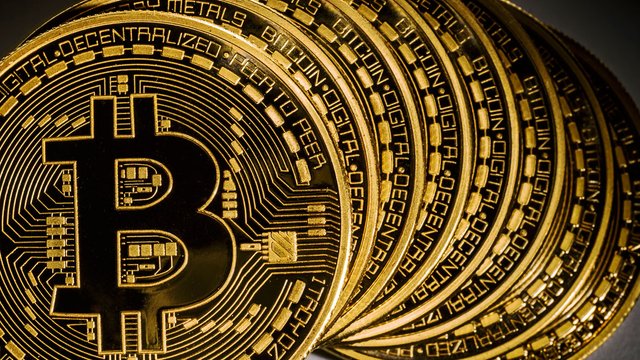BITCOIN COULD CHANGE THE WORLD EVEN IF IT CRASHES
HELLO DEAR STEEMIANS!
We all become interested in the crypto currencies and Bitcoin is the most
popular! So we want to know more about it everyday!
So, here's another update from
CBS News
Irina Ivanova
The prices of digital currencies like bitcoin, litecoin, ethereum, ripple and others have been all over the map in recent months, soaring more than 1,000 percent before falling sharply amid government intervention in Asia. The get-rich-quick appeal of cryptocurrencies has everyone from flashy music stars and Hollywood actors to Wall Street and average investors climbing aboard the craze.
Within what many experts see as a classic market bubble, however, lies a potentially revolutionary innovation. That technology, saddled with the unfaddish name "blockchain," could change everything from how people make payments online, to how countries fight corruption, to the very relationship between government and citizens.
The upshot: If the price of bitcoin were to crash to earth tomorrow, blockchain would likely outlive it -- and continue to reshape the world in myriad other ways.
"Blockchain is the technology, and bitcoin is one application of the technology," said Jen Schwartz, a senior features editor at Scientific American.
A framework for data
At its simplest, blockchain is a way of structuring data -- a framework. The creator of blockchain, a person calling themselves "Satoshi Nakamoto" whose identity remains anonymous, invented blockchain in order to create a currency that is independent from a central authority. But in the process, Nakamoto invented a way to securely transmit data in a way that it is indelibly recorded.
"Blockchain technology can be used to keep track of and transact any data beyond bitcoin," said Schwartz, who edited the magazine's recent issue on the future of money. "The idea is that instead of intermediaries deciding if something is valid and keeping it secure, math and machines are taking on that role."
To understand this concept of permanence as it applies to blockchain, consider how bitcoin is exchanged. When a person wants to make a purchase or send bitcoin to someone else, the process to verify and secure that transaction happens across a network of computers. The computers race to solve complex math problems as a few transactions are bundled together into a "block," which is then connected to all the transactions that have preceded it. That's what's known as a blockchain.
Described another way, the blockchain is a digital ledger that keeps track of all transactions that have taken place with a particular piece of currency.
Keeping records
Ledgers already exist for any number of things. When you move money between bank accounts, for instance, there's no armored car moving cash from vault to vault for every transfer; instead, a ledger keeps track of funds in each account.
Blockchain solves a problem that has plagued digital currencies since they were first invented in the 1980s: Because all the transactions are connected in perpetuity, you can't spend the same money twice. It also offers the possibility of re-imagining database systems already in existence, creating something more transparent.
"It could prove to be a broader force for transparency and integrity in society, including in the fight against bribery and corruption," the World Economic Forum wrote in its inaugural report on blockchain last year. "It could also lead to extensive changes in supply chains and governmental functions, such as central banking."
It's also secure. "If you try to screw with any part of the system, it would affect every single part of the chain," said Schwartz. "It's really difficult to infiltrate the chain."
Because the bitcoin blockchain is decentralized, it appeals to many people who are suspicious of government institutions. Instead of being stored in one place, like the server at a bank or even a cloud server owned by Facebook or Google, it's stored across a network of computers. That prevents a single authority from controlling it, proponents say. Equally important, the technology could be used for many other applications.
Proving that you're you
For proponents like Natalie Smolenski, a cultural anthropologist who works at Learning Machine, a blockchain company, the technology has the potential to help forge a digital world run by its users. That vision stands in stark contrast to the current internet, which is largely dominated by the triumvirate of Google, Facebook and Amazon.
But it also has narrower and more practical applications. For example, a blockchain-based ID could verify that a person is who they claim to be without relying on third parties, like a government agency, academic institution or department of motor vehicles, she said.
"Right now, you're relying on a platform provider to verify your identity for you. When you create an account with Google or with Facebook, they are the owners of that digital identity. They can change it, they can delete it," Smolenski said. "The ability to directly own your digital identity and to choose when and how you self-disclose in a digital space is huge."
The record-keeping nature of blockchain makes it particularly useful for applications where tracking is essential, such as for companies that produce and ship goods around the world. Want to ensure a product marketed as "fair trade" or "single origin" is what it claims to be? Provenance, a startup in the U.K., uses blockchain to trace the origins and path of ingredients. The nonprofit BitGive is trying to do something of the reverse -- tracking the dissemination of charitable donations. Specifically, BitGive raises funds for specific charitable projects and then tracks bitcoins to specific project outcomes.
To be sure, blockchain technology still has plenty of constraints. While the blockchain that supports bitcoin is designed to be decentralized, it's possible to build a blockchain structure that is very centralized. That goes against the technology's original concept to spread authority among many participants. Some large financial institutions are now looking to use blockchain in this fashion as a way to verify their transactions.
And while the blockchain itself is secure, applications that connect to it -- like "wallets" that store digital currency -- aren't impenetrable, in some cases allowing hackers to steal millions in bitcoin and other cryptocurrencies.
Schwartz compares blockchain to the early days of the internet: lots of potential, and lots of potential pitfalls.
"To say that it's a universally good technology is not true," she said. "All blockchain is -- all cryptocurrencies are -- is just code. Who's writing the code? And who's changing the code? Who are the developers of this thing, and who's able to change it?"
CBS News
Irina Ivanova
Thank you very much for stopping by!
Have a great day!

.jpg)


